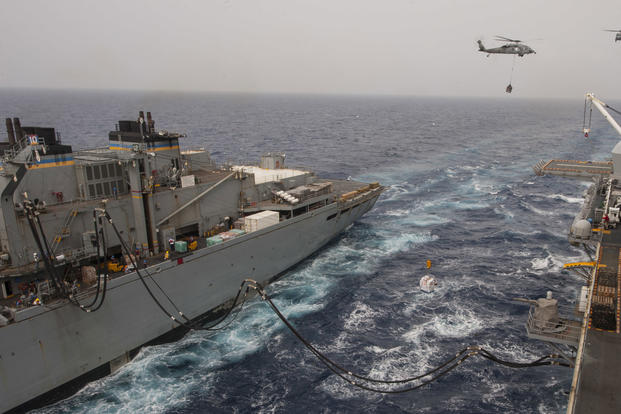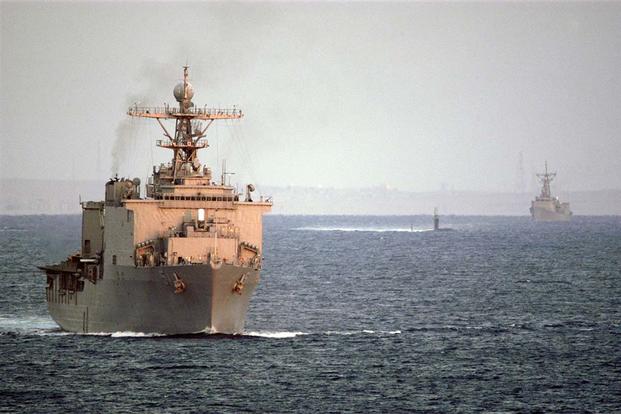The military began the long process of winding down its relief efforts in Puerto Rico and the U.S. Virgin Islands on Thursday with the withdrawal of the amphibious assault ship Wasp and the transport dock Oak Hill.
Following consultations with Puerto Rico Gov. Ricardo Rossello, the Defense Department decided the Wasp and the Oak Hill "are no longer needed" in the response to Hurricane Maria, which hit the islands on Sept. 20 as a Category 4 storm.
In a statement, the DoD said the ships had been focused on helicopter and tilt-rotor aircraft support, but the military, in concert with the Federal Emergency Management Agency, decided "there are sufficient land-based helicopters and tilt-rotor lift capabilities in the territories to continue helping the people of Puerto Rico and the U.S. Virgin Islands as they recover."
The Wasp and Oak Hill "have provided great value to the overall response effort, contributing search-and-rescue capabilities that saved lives. They are now proceeding on to their next missions in defense of our nation," the DoD said.
The Wasp left Naval Station Norfolk, Virginia, in late August en route to Sasebo Naval Base, Japan, to become the flagship of the 7th Fleet's amphibious forces when it was diverted to hurricane relief.
As the amphib flagship in Japan, the Wasp will have the capability to support next-generation F-35B Lightning II fighters. The aircraft are flown by Marine Fighter Attack Squadron 121, which arrived in January at Marine Corps Air Station Iwakuni in Japan.
At the time of the ship's departure from Norfolk, Capt. Andrew Smith, commander of the Wasp, said in a statement that the move to Japan "ensures that our most technologically advanced air warfare platforms are forward deployed."
"Our capabilities, paired with the F-35B Joint Strike Fighter, increases our Navy's precision-strike capabilities within the 7th Fleet region," he said.
The Wasp and Oak Hill depart as Puerto Rico struggles against setbacks in the effort to restore the island's aging and poorly maintained power grid for its 3.4 million U.S. citizen residents.
In an update on the recovery Tuesday, the DoD said only 18 percent of Puerto Rico Electric Power Authority (PREPA) customers had electricity off the grid -- a reduction of 3.2 percent from last week.
The power restoration project has become mired in disputes over contracts and the management of PREPA.
In a statement Wednesday, the federal board that oversees Puerto Rico's $70 billion in debt to bondholders announced its "intent to appoint" retired Air Force Col. Noel Zamot "as chief transformation officer" of PREPA, National Public Radio reported.
In a Spanish-language statement, Rossello challenged the appointment. He said the management of PREPA and other island agencies "rests exclusively on democratically elected officials. Puerto Rico will be zealous in defending the people from any action that seeks to undermine this process."
Rossello has also questioned the awarding of a $300 million power restoration project to Whitefish Energy Holdings, a tiny firm based in Whitefish, Montana -- the hometown of Interior Secretary Ryan Zinke.
-- Richard Sisk can be reached at Richard.Sisk@Military.com.



























